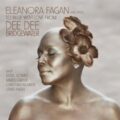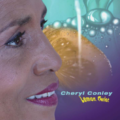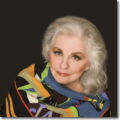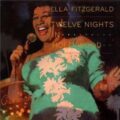Dee Dee Bridgewater, Eleanora Fagan (1917-1959): To Billie With Love From Dee Dee
Posted on Wednesday, June, 30, 2010 | Comments Off on Dee Dee Bridgewater, Eleanora Fagan (1917-1959): To Billie With Love From Dee Dee
Over the course of a multifaceted career that has spanned four decades, Dee Dee Bridgewater has risen to the top tier of today’s jazz vocalists, putting her own unique spin on standards as well as taking intrepid leaps of faith in re-envisioning jazz classics. For her latest recording, Eleanora Fagan (1917-1959): To Billie With Love From Dee Dee, Bridgewater honors an iconic jazz figure, Billie Holiday, who died tragically at the age of 44 a half-century ago. “This album is my way of paying my respect to a vocalist who made it possible for singers like me to carve out a career for ourselves,” says Bridgewater, who performed the role of Holiday in the triumphant theatrical production, Lady Day—based on the singer’s autobiography, Lady Sings the Blues—staged in Paris and London in 1986 and 1987. “I wanted Eleanora Fagan to be something different: more modern and a celebration, not a [recording] that goes dark and sullen and maudlin. I wanted the album to be joyful.” Bridgewater adds that Eleanora Fagan goes far deeper than being a tribute album of retreaded Holiday tunes. “Billie deserves to have her music heard in another light,” she says, “and I definitely didn’t set out to imitate her.” Key to the fresh approach is pianist Edsel Gomez, Bridgewater’s longtime band mate who wrote new arrangements for the 12 songs on the album, including the African polyrhythmic-charged interpretation of “Lady Sings the Blues, “ a reharmonized version of “All of Me” and the gospel-tinged “God Bless the Child.” Says Bridgewater: “Edsel is an extremely gifted, talented arranger with very modern ideas. Edsel has the ability to be modern and work in a tasteful fashion.” Gomez took on the daunting challenge of bringing new life to the music with enthusiasm. “I listened to everything Billie Holiday ever recorded,” he says. “I let her music speak to...
Cheryl Conley, Lemon Twist
Posted on Wednesday, June, 30, 2010 | Comments Off on Cheryl Conley, Lemon Twist
“Phrasing with the sensitivity of a horn player, her intonation flawless” was quoted by Leonard Feather of the Los Angeles Times, while others have crowned her style, and showmanship of music, as the rebirth of Jazz. Cheryl Conley native of Pasadena California, and the eldest daughter of Britt & Alice Conley, remembers hearing the sweet sounds of Billie Holiday, Nat King Cole, and Etta James. Her musical talent was apparent at an early age, chosen as lead in her second grade spring program. Playing the flute by 5th grade awarded Cheryl a vocal scholarship in the 10th grade to attend the USC Idyllwild School of Music and the Arts summer program. Joining the Ike and Tina Turner Review as an Ikette during her senior year in high school, Cheryl has been quoted saying “I wrote my mother a note and took off”. The Ike and Tina Turner Review as set to open for the Rollin Stones in England in May, but Cheryl decided graduating from High School in June was her first priority, so she elected to stay behind. Cheryl hit the ground running, first recording “I Found Someone of My Own” with Columbia Records pop group, The Free Movement in the 70’s, and later featured as lead vocalist with The Cal State University Los Angeles Jazz Band opening the historical Playboy Jazz Festival in 1982. Cheryl was the first voice major to receive a music degree in Jazz Studies from Cal State University Los Angeles. Later years, Cheryl was standing performer at Palermo Restaurant in Hollywood, Catalina’s Bar and Grill, The Hip Kitty, and Nick & Stef’s in Los Angeles, as well as, opening two venues, Café 322 in Sierra Madre, CA, and Red White and Blues in Pasadena, CA. In April 2008 Cheryl self produced her first production “A Tribute To Women In Jazz”. The Show featured...
Carol Sloane
Posted on Wednesday, June, 30, 2010 | Comments Off on Carol Sloane
Carol Sloane was born to Claudia and Frank Morvan on March 5, 1937, in Providence, Rhode Island, the older of two daughters, but she never lived in that city. Instead, she spent her happy childhood in the small town of Smithfield, just a few short miles north of the city. Her parents worked steadily through the years of World War II in the textile mill near their home. Carol was the lucky member of a large family of cousins, aunts and uncles who all possessed natural singing voices. Only one uncle ever received formal musical education, and he played the tenor sax. In 1951, her Uncle Joe arranged an audition for her with a society dance band led by Ed Drew, and she began singing the stock arrangements of popular hits of the day each Wednesday and Saturday night at Rhodes-on-the-Pawtuxet Ballroom, located in Cranston, Rhode Island. In 1955, Carol married a Providence disc jockey named Charlie Jefferds, and almost immediately, the couple found themselves at Fort Carson, Colorado where Charlie endured the rigors of basic training followed by a one-year obligatory tour of duty in Germany. They returned to the US in January 1958, and were amicably divorced in that year. Carol continued to sing in small bars and clubs until she met the road manager of the Les and Larry Elgart Orchestra, which was touring the amusement park ballrooms in the southern New England area. She auditioned for Larry Elgart, who then asked her to come to New York with his band. The brothers had recently split the organization, Les taking the territory west of Chicago, Larry to handle everything east of Chicago. Larry Elgart suggested she change her name to Carol Sloane. The “road years” with the Larry Elgart band continued until 1960, when the road simply became too boring and too difficult for her. After two...
Tessa Souter, Obsession
Posted on Wednesday, June, 2, 2010 | Comments Off on Tessa Souter, Obsession
Tessa Souter is a consummate and dedicated vocalist who is deservedly on the rise in the New York jazz scene and elsewhere. A contralto who sings with both precision and emotion, her impressionist and minimalist interpretations bring out the meanings of her songs while remaining true to their melodic lines. Following Listen Love (Nara Music, 2004) and Nights of Key Largo (Venus Records, 2008), Obsessioncontinues her in-depth preoccupation with the nature and experience of love, but with a slight shift to the Latin rhythmic side. In this respect, she is helped along by a well-chosen ensemble of instrumentalists who surround her with gentle warmth. By incorporating guitar (Jason Ennis), accordion (Victor Prieto), and violin (Todd Reynolds) into the group, Souter establishes a sultry feeling of a late night cabana in a southern clime. This provides the backdrop for further reflections on the vicissitudes of intimacy which she pursued in her previous recordings. The songs are well-chosen and carefully crafted, and the arrangements are done with great care to evoke an intended range of feelings and stylistic changes. The recording begins on the lonely 1960s note of The Beatles’ “Eleanor Rigby,” and goes on to songs such as “Riverman,” “Obsession,” and “White Room,” which evoke the passionate, obsessive side of love. “Afro Blue/Footprints” evokes John Coltrane’s classic in an urbane manner, leading up to “Make This City Ours Tonight,” while the remaining songs explore the light and dark aspects of intimacy, always with echoes of Latin genres. The instrumentalists complement Souter’s singing with interpretive sensitivity, with Ennis’ playing especially striking. Souter stands out in a large field of contemporary jazz vocalists because, unlike most of them, she thinks before she sings and never compromises the music with irrelevancies. She thinks not only of the music itself, to which she brings ample talent and sophistication, but also almost philosophically about what she wants to say. She...
Ella Fitzgerald, “Twelve Nights in Hollywood”
Posted on Monday, April, 19, 2010 | Comments Off on Ella Fitzgerald, “Twelve Nights in Hollywood”
This 4-CD collection is a real gem unearthed from Verve’s vaults — 73 previously unreleased live small-group recordings from the “First Lady of Song.” In some cases these are the first and/or only live versions of the songs she ever recorded. This is Ella at the creative peak of her career. Verve founder Norman Granz personally supervised the live recordings over 12 nights in 1961 and 1962 of every set Fitzgerald performed with her quartet in the intimate setting of Los Angeles’ Crescendo Club. This collection finds Ella ranging through her entire repertoire from the familiar to the obscure, including new versions of her earliest hits (“A-Tisket, A-Tasket”) and those of her peers Billie Holiday (“Good Morning Heartache”) and Frank Sinatra (“The Lady is A Tramp”). And there’s the spontaneity and humor ever present in Ella’s live performances — whether she’s messing up the lyrics to “Blue Moon” without skipping a beat or affectionately imitating Louis Armstrong and Dinah Washington on “Bill...







 The VOCAL SOUND OF JAZZ began airing on 89.5 FM (now WHRV-FM) on January 4th 1980. Originally a 30 minute program that aired on Friday evenings, the program expanded to it current 60 minute format and moved to Saturday evenings during the 90s. It was also aired over WUOM in Ann Arbor, Michigan for a five-year period in the late 1980s.
Produced and hosted by Jack Frieden since its premiere broadcast, the program has always attempted to spotlight both jazz vocal music’s post 1950s history, as well as the new singers and songs that will continue to play an increasingly prominent role in the music’s future. With the internet’s ability to attract and entertain jazz vocal fans globally, Jack looks forward to broadening the mission and reach of the “Vocal Sound of Jazz” in coming years.
Email Jack Frieden
Vocal Sound of Jazz LLC
1056 Downshire Chase
Virginia Beach, Va. 23452
Ph: 757 438 6785
The VOCAL SOUND OF JAZZ began airing on 89.5 FM (now WHRV-FM) on January 4th 1980. Originally a 30 minute program that aired on Friday evenings, the program expanded to it current 60 minute format and moved to Saturday evenings during the 90s. It was also aired over WUOM in Ann Arbor, Michigan for a five-year period in the late 1980s.
Produced and hosted by Jack Frieden since its premiere broadcast, the program has always attempted to spotlight both jazz vocal music’s post 1950s history, as well as the new singers and songs that will continue to play an increasingly prominent role in the music’s future. With the internet’s ability to attract and entertain jazz vocal fans globally, Jack looks forward to broadening the mission and reach of the “Vocal Sound of Jazz” in coming years.
Email Jack Frieden
Vocal Sound of Jazz LLC
1056 Downshire Chase
Virginia Beach, Va. 23452
Ph: 757 438 6785